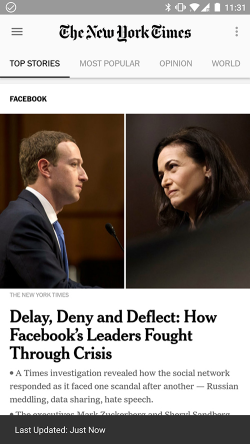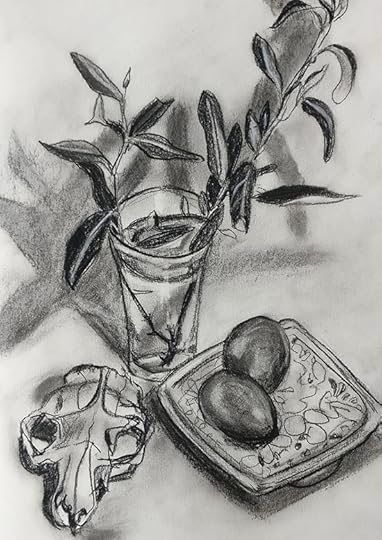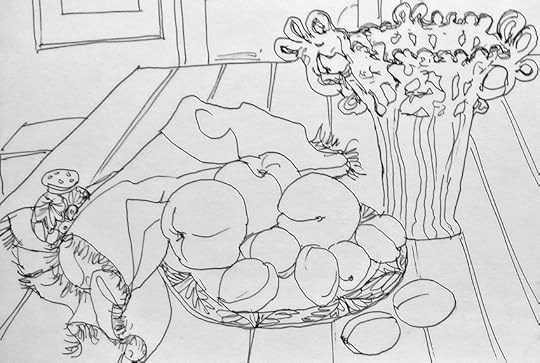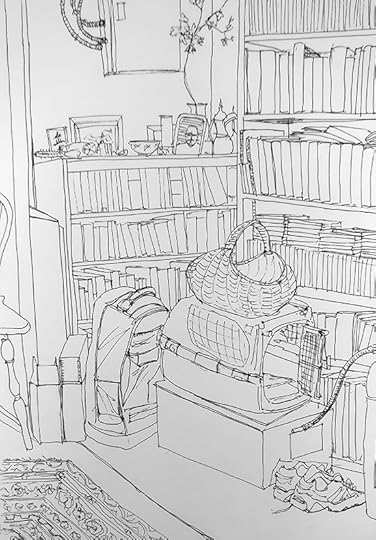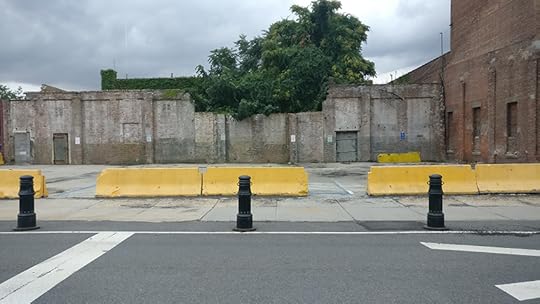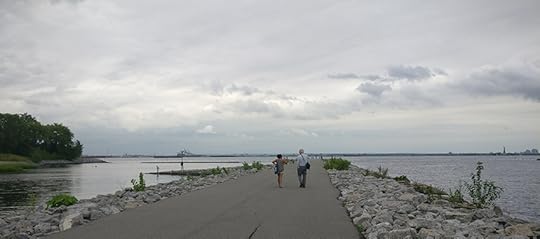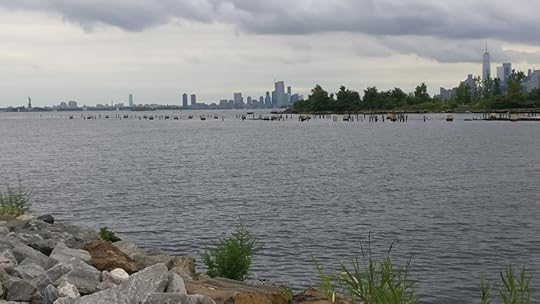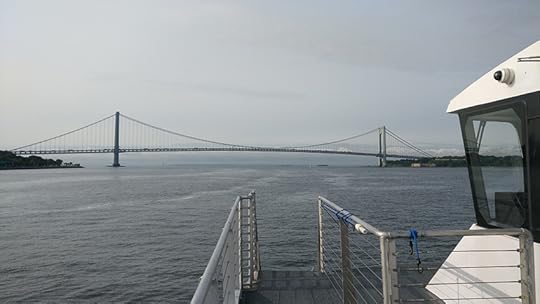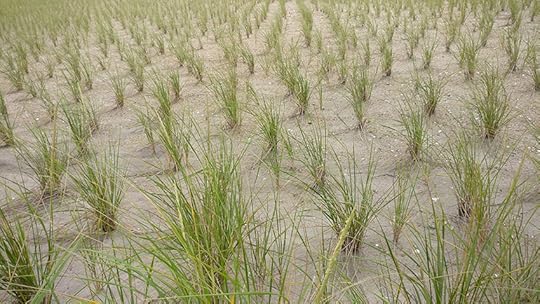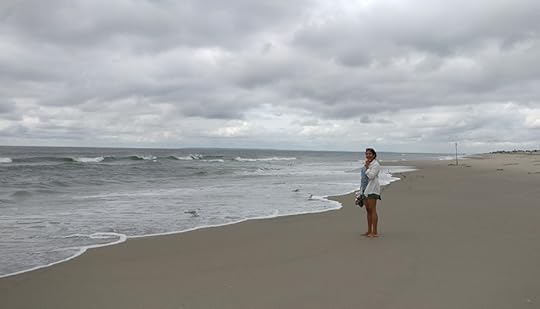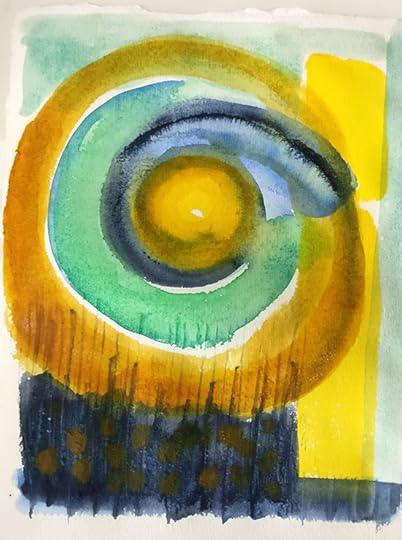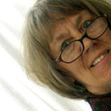Elizabeth Adams's Blog, page 28
November 15, 2018
Complicity: The FB Scandal and Our Individual Responsibility
I haven't yet finished the entire investigative story about FB in today's NY Times, but have read the articles in the Guardian and recently watched a documentary about the company's troubles. Mark Zuckerberg and Sheryl Sandberg come off as even worse than I thought. And I wonder how, in good conscience, any of us can stay here on this platform that touts liberal rhetoric about openness and connecting the world, while actually being capitalist and self-serving to the point of hiring conservative firms to spread fake news against its detractors, let alone ignoring information about Russian hackers and fake-news farms and hacking of their own users' "secure" information, and failing to take action until after the damage was done. They have turned into what they say they hate, and are using all of us for one primary purpose: to make billions of dollars.
My activity on FB has never been great, but it's decreased, quite deliberately. I rarely write direct posts there, and only occasionally "like" something my friends have posted. Its main usefulness to me, other than allowing me to see some family and friends who don't keep in touch any other way, is in publicizing events for the cathedral (which, if we really looked at it theologically, has no business being on FB at all) and cross-posting links to new blog posts. As I've written before, most of the comments I get at The Cassandra Pages, and a lot of the traffic, now comes via social media. I have fewer problems with the way Instagram works, which FB owns, and with the community there, because I am not constantly peppered with ads (they can be blocked), news, and opinions and the community where I interact is much quieter and more concerned with the same values as I am.
But the bottom line is this: what FB is doing is wrong. George Soros is right when he says it's a threat to democracy. Yet we have all become hostage to it because it preys on all our deepest insecurities and desires. I don't want to lose the blog traffic I have. I don't want to lose the ability to publicize events, or a new book from Phoenicia -- though buying paid advertising is a business transaction, and I am more OK with that. And I don't want to lose touch with certain friends -- but, you know, email still exists. It just takes a little more effort.
It's like so much else that's wrong with our world. We choose convenience and connection and take the easy way out, even when it makes us complicit in data-mining schemes or the spread of fake news, even when it enriches unscrupulous people, even when our actions harm the planet. We are sheep. Human beings don't seem to have the will to do what is right in large enough numbers to make the differences that needs to be made, or to send the message to both government and business that we won't tolerate their behavior any longer. If I delete my FB account, it will be a useless gesture that will have no effect other than making a statement like this one; I'll only be hurting myself. But it still may be the right thing to do.
November 7, 2018
Bright Faces of Hope, and a Long Uphill Road Ahead
The first two Native-American women. First two Muslim women. First Somali-American, a former refugee. Youngest woman ever, a Latina. First black female congresswoman from her state...They are the hope for me today: the brown female faces of those who won seats in the U.S. House of Representatives, along with many white women who also won races, and the first gay male state governor. These are the faces of the future — though their majority power may be very far away, beyond my lifetime even.
When I look at the map, the polarization is depressingly clear, and I can’t even feel smug about Quebec being better, after our last election. It was just the same: most of the rural, homogeneous French-Canadian areas went conservative, while the diverse metropolitan areas (chiefly Montreal) were solidly progressive. The real question in so many places today seems to be: do you want someone who will actually work for the things that benefit all people, or do you want someone who looks like you, expresses the same fears, and wants to go back to the past?
There were a lot of “firsts” yesterday. That’s very significant, though it made me simultaneously weep with happiness at seeing those faces, and rage that it’s taken so long and come with such a hard fight –- which will, of course, have to continue. And I'm not naive. These are modest gains, and even a Democratically-controlled House will, at best, create a stalemate with the executive branch and Senate, that will of course be blamed for blocking legislation and starting investigations. I'm appalled at the support this president still enjoys, and in some parts of the country, it seems more solid than ever, with a looming possibility of re-election in 2020.
--
Looking at the Senate and House electoral maps today caused me to reflect on the election of Gene Robinson, the first openly gay bishop in the Episcopal Church of the United States, ten years ago. The church’s polity is set up the same way as Congress, with a House of Bishops, one from each diocese, and a much larger body made up of lay delegates and clergy, equally represented by four of each from every diocese. In every single step toward inclusivity — allowing the ordination of the first black priest, the first woman, the first openly gay priest, and then bishops in each of those categories — the House of Deputies voted positively years before the House of Bishops did, and in exactly that order: blacks, women, gay. And of course, representation in the House of Deputies was itself reflective of that diversity long before there were black, female, and gay bishops. But it did happen. The people in the churches elected the delegates and changed those bodies; the lay delegates pushed the clergy to be more progressive, and eventually even the House of Bishops changed. It's inevitable, but it took a long, long time even in one of the most progressive religious denominations in the United States. Ten years later, however, a great deal has changed in attitudes toward homosexuality in the general population, friends and colleagues, and forced them to confront a choice between love or rejection of real people. We should see this as an indication that change is absolutely possible.
--
I've been on the side of immigrants and non-whites all my life, and especially so since marrying into an Arab/Armenian immigrant family, with multiple personal histories of genocide and narrow escapes from persecution to begin life again in new places. Twelve years of being a Canadian-American, and having opportunities to travel, especially in Latin America, have only made me MORE sympathetic and more identified with migrants and refugees. I’m grateful for my life experiences and fervently wish I could share them with a lot more people, because I think if you don’t live it, or have very close relationships with people who do, it’s hard to really get it. Thus, the map we keep seeing, and the fears that keep being exploited.
Besides this endemic hatred of "the other", the environment is the other issue that creates ongoing despair for me. There is so little time, and so little will on the parts of governments -- in fact I believe we've already passed a critical window where reversal was possible. So much of what I have valued and loved about the Earth is in danger of being lost forever. To me, this is the fundamental issue of our time, and even here in Quebec, where many people say they do care about the natural world and live close to it, the new government feels it is not important, and secondary to economic concerns. How shortsighted can we be?
Today is a day to rejoice in a first step back from the precipice Trump's presidency has placed us in. Frankly, though, we can't let up for a minute.
October 30, 2018
Why the hell are we still blogging?
My good friend Rachel Barenblat of The Velveteen Rabbi wrote recently, saying she was celebrating (like several of us) fifteen years of blogging, and wondering if we might like to do some sort of collaborative observance. She also invited Dave Bonta of Via Negativa, Lorianne DiSabato of Hoarded Ordinaries, Dale Favier of Mole, and Natalie d'Arbeloff of Blaugustine. We all met way back then, and have been good friends and readers and supporters of each other's work ever since -- so of course everybody said "yes." Here are some excerpts from the first installment, which was in answer to the question posed in the subject line of this post. After you've had a look, I'd like to turn the question around and ask you: Why are you still reading blogs?
Buried Temple, by Natalie D'Arbeloff. Acrylic on paper, 37cm x 37 cm.
Why the hell are we still blogging?
Rachel: Writing is one of the fundamental ways I experience and explore the world, both the external world and my own internal world. I think it was EM Forster who wrote, “How do I know what I think until I see what I say?” Blogging as I’ve come to understand it is living one’s life in the open, with spiritual authenticity and intellectual curiosity, ideally in conversation or relationship with others who are doing the same.
Dave: At some level, it's easier to keep blogging at Via Negativa, the Morning Porch, and Moving Poems than it is to stop. Basically I'm an addict. Writing poetry is fun for me — entering that meditative head-space required for immersion in writing. As for the social aspect, I've been in, or on the periphery of, several distinct blogging communities over the years, and at one time, we all commented on each other's sites, but with the rise of social media, most blog commenting went away — and I'm not entirely sure that's a bad thing. Writing and responding to comments did take up a lot of my time ten years ago, and now that I can scratch that conversational itch on Twitter, or in real life with my partner, I'm OK with most interactions on my blogs being limited to pings. But I must immediately qualify that and admit that Via Negativa is a special case, because for well over half its existence now I've enjoyed the virtual companionship of a co-blogger, the brilliant and prolific poet Luisa Igloria, and a small number of occasional guest bloggers as well. I wouldn't say I'm competitive, but Luisa's commitment to a daily poetry practice has definitely forced me to up my game. Then there's Mr. Pepys. My Pepys Diary erasure project grew directly from sociability: my partner and I wanted to read the online version of the diary together, and I worried I might eventually get bored with it if I weren't mining it for blog fodder.
Lorianne: I am not attached to the medium, but I am attached to the message, and the process of creating/sharing that message. There has been a lot of hand-wringing among bloggers over the “death of the blog,” with long-time (and former) bloggers worried about attention divides between blogs and social media. Where do “I” live if I post in multiple places: on blog, in a paper notebook, on social media? For those of us who do all three, the result can be confusing, distracting, and frazzling...or it can be creative, collaborative, and synergistic.
Dale: I didn’t really expect ever to have readers, so in a way, having readership dwindle is a return to the early days... I’ve outlived some of my personas -- I’m no longer recognizeably very Buddhist, and my politics have morphed in some odd ways. I don’t think I’m as salable an item as I used to be :-) But the inertia, as Dave said. When I do have something to say and my censor doesn’t step in, the blog is still where I go. It’s been home for fifteen years: my strand of the web… The community that was established way back when is still important to me, and still a large part of my life. And there’s still a lot of value in having a public space. The act of making something public changes it, changes how I look at. I become the viewers and the potential viewers. It helps me get out of myself. It helps me work through my favorite game of “what if I’m wrong about all these things?”
Natalie: Why the hell still blogging? Not sure I am still blogging. I put something up on Facebook whenever I feel like saying hey, listen, or hey, look at this. Then I copy/paste the post to Blogger where I keep Blaugustine going, mainly out of a sense of imaginary duty. The idea that there are some real people out there who may be actually interested in some of my thoughts and/or artwork is undoubtedly attractive, even necessary. I live a mostly hermit life and don’t get much feedback of any kind. But my interior life is very active, all the time, and having a tiny public platform online where I can put stuff is really helpful. To be perfectly honest I think that’s about it for me and blogging at present. I don’t do any other social media, it would all take too much time which I’d rather devote to artwork.
Beth: I think a lot of it has to do with a sense of place. My blog is like a garden or a living room that I’ve put energy and thought and care into as a place that’s a reflection of myself and is hopefully welcoming for others.. The discipline of gathering work and talking about it coherently has been extremely good for me and for my art practice. And I’ve also really appreciated and been inspired by other people who do the same, whatever their means of expression. There’s something deeply meaningful about following someone’s body of work, and their struggles, over not just months but years. In today’s climate of too-muchness and attention-seeking and short attention spans, I feel so encouraged and supported by the quiet, serious doggedness of other people like me!
So...why are you still reading blogs? Are you a writer or artist who's still blogging yourself?
October 13, 2018
Back to oils
Three weeks ago, I turned 66, and acted on a decision I've been making over the past couple of months: I started painting in oils again.
Even though we have this spacious and light-filled studio here in Montreal, for some reason I stopped working in oils after we moved back in 2006, turning instead to media that were complementary to my newly-established publishing business -- like linocut -- and doing more daily sketching and drawing. When I painted, it tended to be in watercolor or acrylic, or else I worked in pastel or charcoal -- all works on paper that took up less storage space and were odorless. My mother's big easel, made by my dad, has been set up here the entire time, but I haven't used it very much; I tend to work standing up at my large, adjustable drawing table.
In Vermont, I had a small painting studio in a room in the back of our garage; it looked out on the garden and functioned as both studio and a meditation/quiet space for me. I missed that space a lot when we moved here, and it wasn't easy for me to learn to share a big open space with my husband, or to find the concentrated, solitary focus that painting -- so I always thought -- requires. But I've changed over these years; we work here together quite happily now, with the room somewhat divided in half but without barriers or partitions, each quietly doing our own thing.
Clementine and Mexican ceramics, A recent watercolor, 9" x 6" (detail).
Oil painting used to be my main medium, and it's what matters to me the most. I'm not sure why -- perhaps I think it has a better chance of lasting, but I think it's mostly because it presents the greatest challenges. Watercolor is notoriously difficult and unforgiving, it's true, and I love it and will always work in it. But for some reason, I've experienced greater highs and deeper lows with oil, and I think that struggle has taught me the most about myself.
Getting back to oils has been in my mind over the past year or so -- a kind of nagging little voice in the back of my head. When we lost our friend and fellow artist, Jenny, at the end of the summer, and I thought about my own upcoming birthday, I realized a decision had already been made, almost without consciously realizing it. Jenny had also worked in many different media over her lifetime, but in recent years she had turned to ceramics and was making fantastic, often whimsical objects and sculptures that were a reflection of her personality and spirit -- and she loved it, she had really found her perfect medium. At the musical wake the day after Jenny's memorial service, I sat on the couch in their apartment, singing and listening to music being played, talking to old friends, while looking at Jenny's ceramics arrayed on a long window shelf, the towers of Manhattan rising behind them. On a perpendicular wall, over the piano, was an oil painting of mine that I gave Jenny and Bill a long time ago, accompanied by one of Jonathan's photographs, and a portrait in oils of Jenny's mother by a well-known New York artist. It made me think. To some extent, my desire to start again in this medium is a way to remember and honor our friend, and acknowledge that time is passing. If not now, when?
Rocks and Cacti at Cefalu. Oil on canvas, 10" x 12".
Of course, the decision to start again with something I'd left off more than a decade ago came with some questions. I'm not the same person I was then, and I've changed as an artist too; it's not a resumption, it's more of a new beginning. First off, did it have to be oils? I had bought new acrylics over the past years. Though I'm not a snob about it, acrylics have never completely satisfied me for painting on canvas, and I like using them on paper, but they didn't call to me. I have a lovely French box easel, too, that is portable and folds up into a small space; I took it apart and set it up; my paints were stored in the drawer. I did an inventory of my supplies, which were not in great shape or abundance. Nevertheless, I got out a small canvas, squeezed some oil paint onto a palette, poured some odorless medium into a cup. I took up a brush. With the first stroke came a rush of sensory impressions, followed by strong memories. It felt not just OK, but very good.

View of Cefalu. Oil on canvas, 12" x 10".
The second question was, and still is, where do I want to go with it? In the last two weeks I did two small paintings to get back my feel for the medium and how to handle it, and although neither feels like an indication of direction, they were both helpful and I enjoyed doing them. I've been looking at a lot of work in books and online; I've been thinking both about the places we've traveled -- the light in the Mediterranean and in Mexico -- and also about the still lives I've drawn steadily for a long while. I've been doing some color tests; another thing that's changed is that I'm more analytical now and more willing to put in the effort to learn more about my tools. I'm not going to try to force anything, but I have some ideas; we'll see what happens and what grows naturally out of the process of doing. One big change is that I know that whatever I paint now will be greatly supported by all the drawing I've done since 2010. Drawing is always the foundation, even when the work is abstract.
Toward the sea, Agrigento. 9" x 6", charcoal and graphite on toned paper. A drawing for a new painting.
It makes me happy to be doing this. Painting always feels like a miracle to me, as do all the arts: beginning from blankness and silence, then creating and building something that grows out of what felt empty, but was always actually filled with potential. What could be more hopeful and life-affirming than that? And yet it's so easy to get caught in the destructive and doubting void, particularly now, when the world often feels hopeless and negative, and so many are despairing and angry. I don't want to be like that; I want to work, as long as I'm able, to see and express something better and more beautiful about our world and my small place in it. That's the real decision that was made.
September 27, 2018
#BelieveSurvivors
This is a picture from Monday afternoon at 1:00 pm, when there was a national walkout in support of Christine Blasey Ford. Many of us posted pictures of ourselves wearing black on social media, with the hashtags #BelieveSurvivors and #stopkavanaugh Another action is taking place now, as she testifies.
I remember the Anita Hill hearings thirty years ago, against Clarence Thomas - a man completely unfit for the Supreme Court. Hill was vilified and Thomas was confirmed; he's been a terrible justice ever since. It's inconceivable to me that this many years have gone by and we are in a similar place yet again, led by a cabal of white men who think they are entitled to treat women as objects.
It says something that most of my women friends are posting today about the courage of Christine Blasey Ford and how difficult and deeply discouraging these days are for them, while most of the men -- even the liberal ones -- are posting...well, let's just say, the usual stuff. For many of us women, it is impossible to look away or to think of much else right now. There is a disconnect between the sexes that goes very deep in our society, just as there is a deep disconnect between the races, and until that changes fundamentally, we will keep repeating the pain. I have appreciated the men, like my own husband, who have expressed their understanding and dismay, and I would ask that those of you who haven't please try to put yourselves in our places as people who have endured behaviors, harassment and assaults that have affected us all our lives - and yet we have tried our best to forgive those who hurt us, to love and trust other men, and enter into full, loving relationships with them. Please try to think about that, and what it takes.
September 10, 2018
Art Report, Late Summer Drawings
Autumn olive and fossil, pen and ink, 9" x 12.
I'm trying to finish the images for The Fig and the Orchid, my book about my father-in-law. The drawing above is one of them.
Autumn olive, skull and two brown eggs in a dish. Charcoal on paper, 9" x 12". This was the first drawing, the line drawing was a few days later.
It's been a complicated couple of months. Lots of travel, family visiting, and guests here in Montreal, overlaid with the deep sadness of a close friend's serious illness, and of course the ongoing political nightmare.
Peaches and plums with Jenny's vase. Pen and ink, 9" x 6".
Drawing has been one way I've tried to deal with the sense that the world is teetering as well as my own impotence in the face of it. Getting my body moving has been another helpful practice and resolve; both my husband and I are trying to get as much exercise as we can. I've been playing the piano some, and as of yesterday, our choir season started up again.
A corner of the studio. Pen and ink, 9" x 12".
Reading, as always, is a solace; friends have been stalwart and kind; and I'm grateful every single day for my home here in Canada, where the society and people are, for the most part, still sane. I'll put the drawings in this post, and painting in a subsequent one.
Top of the china cabinet, with a painting of Vermont in winter. Pen and ink, 9" x 6".
August 22, 2018
"Crossing Brooklyn Ferry"
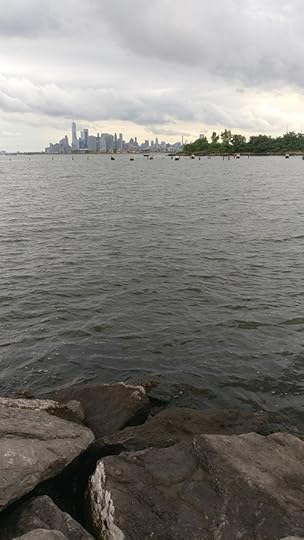
Others will enter the gates of the ferry and cross from shore to shore,
Others will watch the run of the flood-tide,
Others will see the shipping of Manhattan north and west, and the heights of Brooklyn to the south and east,
Others will see the islands large and small;
Fifty years hence, others will see them as they cross, the sun half an hour high,
A hundred years hence, or ever so many hundred years hence, others will see them,
Will enjoy the sunset, the pouring-in of the flood-tide, the falling-back to the sea of the ebb-tide.
--Walt Whitman, "Crossing Brooklyn Ferry"
I've always wanted to enter New York harbor by boat. Crossing the beautiful Verrazano Narrows bridge by car for the first time, a couple of years ago, accentuated that desire. I gazed over the railing at the barges and merchant ships, the sailboats and tugs, and the busy ferries leaving white wakes as they sped toward their destinations across the magnificent harbor, toward the blue towers of Manhattan in the distance, and felt filled with a longing I didn't even understand.
Recently we were in Brooklyn visiting a dear friend. She suggested that we walk down to the Bush Terminal Pier, no longer used for shipping, but recently developed into a low-key waterfront park. We walked down the slanting Brooklyn streets toward the water, along the abandoned warehouses and railroad sidings, and finally out onto the pier.
There, at water-level, we were much closer to Manhattan than from the bridge, but with a similar view: the Statue of Liberty at far left, the new Freedom Tower of lower Manhattan at the right. We were nearly alone; a couple lay on the rocks listening to soft music, and a hooded man sat leaning on his bicycle and gazing across the water at the New Jersey docks.
I looked at the city, and thought about the few times I had been in a boat on this water. I had taken ferries across the Hudson from New Jersey, but had never been in the greater harbor beyond Manhattan. "When I was five, the first time I ever came to the city, my grandparents took me on a boat that went around the island of Manhattan," I told K.
"Yes, the Circle Line," she answered. "It's still running."
"I've always wanted to enter the harbor by boat," I said. "Maybe it's because of my ancestors who came to Brooklyn in the late 1800s -- I think I've always wanted to feel what it might have felt like for them, as much as that's possible now."
She thought for a moment and then said: "There's a ferry from here to Far Rockaway - it goes under the Verrazano and back - we can do it tomorrow!"
And so, we did. We left early the next morning and rode the commuter ferry -- a fast catamaran that, astoundingly, costs the same as a subway ticket -- out of the harbor, through the Narrows, and then east along Coney Island to dock at Far Rockaway, a narrow island that faces the open ocean.
From the pier, we walked across the island -- barely a ten minute affair -- stopping to buy a coffee and a bagel with lox to eat on the ocean-side beach, also barely-populated at that hour on a weekday.
After our breakfast on the sand, we walked barefoot on the water's edge for a while, foamy waves lapping at our ankles, as gulls flew overhead and sandpipers scampered with the incoming and outgoing water, and then headed back to the pier for the return journey and my long-awaited entry into the harbor under dramatic clouds heavy with rain.
I too many and many a time cross’d the river of old,
Watched the Twelfth-month sea-gulls, saw them high in the air floating with motionless wings, oscillating their bodies,
Saw how the glistening yellow lit up parts of their bodies and left the rest in strong shadow...
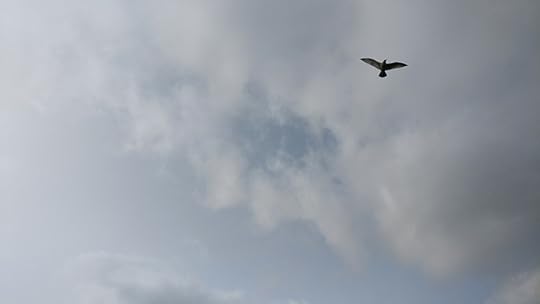
When I posted some pictures of this trip on Instagram, my friend Lorianne of Hoarded Ordinaries pointed me to Walt Whitman's poem, "Crossing Brooklyn Ferry," which was included in the 1856 edition of Leaves of Grass. As I read, I was moved, and felt the distance between the poet and myself collapse, just as he had written a century and a half ago.
I thought about my great-grandfather, who had come from England around the time Whitman wrote his poem, and had become a jeweler in Brooklyn -- the maker of a gold ring that was passed down to me, that I always wear now on the little finger of my right hand.
What is it then between us?
What is the count of the scores or hundreds of years between us?
Whatever it is, it avails not—distance avails not, and place avails not,
I too lived, Brooklyn of ample hills was mine,
I too walk’d the streets of Manhattan island, and bathed in the waters around it,
I too felt the curious abrupt questionings stir within me...
But my thoughts were also personal. I occurred to me that New York has functioned as a kind of touchstone, with my experiences here forming a series that mirrors different stages of my life, and growth; how the intensity and excitement I've always felt in this, my favorite of all cities, used to be accompanied by the insecurities of the small-town country girl that I once was, unsure of how to dress, positive that my inexperience and trepidation were obvious to anyone who saw me.
So many memories! Peering into the magical animated windows of Fifth Avenue shops when I was five, matched by the enchantment of seeing My Fair Lady and Camelot. Walking through scary dark streets near Times Square with a long-haired college boyfriend, now dead, during the gritty days of the 1970s, on our way to see "Fritz the Cat." The seductive energy of walking down Fifth Avenue many years later, on the day I received an offer from a New York publisher -- and how I had turned that offer down and driven out of the city, knowing I'd down the right thing, that the strings attached weren't worth it, or right for me. Marching through the streets in anti-war demonstrations, and looking down at them from the Empire State Building, as a little girl, or the World Trade Center in my forties; going back on a somber day to pay my respects after 9/11.
I thought of some of my closest friends, who've always lived here, and all the things we've done together: the art that fills the museums; the music that fills the theaters and clubs; the food from every corner of the world; the stores where you can buy, or at least look at, just about anything. There have been parties and weddings and funerals, countless meals in ethnic restaurants and New York delis, countless slices of pizza bought on the street. And even though I've become a city person myself, and live in a quite-different large city in a quite-different country, New York (where I've never lived) is still home, in the sense of a place to which I'll always return, a place I hope will remain, not just throughout my own lifetime but, like Whitman, hundreds of years from now, for those who will come after me, because the anonymity and shelter of the great city are also major parts of its identity, just as they shape ours.
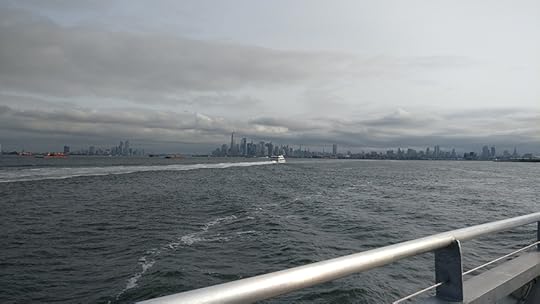
Ah, what can ever be more stately and admirable to me than mast-hemm’d Manhattan?
River and sunset and scallop-edg’d waves of flood-tide?
The sea-gulls oscillating their bodies, the hay-boat in the twilight, and the belated lighter?
Will New York last? I looked at lower Manhattan, where a single tower has replaced the fallen twins. The waters of the harbor, too, will rise -- K. pointed out places that were devastated by Hurricane Sandy, which is unlikely to be an isolated freak event now that the oceans and land are in the grip of global warming.
I don't know. As the ferry passed under the Verrazano and we entered the harbor, I wasn't thinking about any of that anymore; I was just feeling the wind in my hair, looking at the happy faces of the other passengers on the upper deck, none of whom seemed jaded by what was probably a much more routine journey. We overtook a tall white sailboat, and the impossibly dense skyline of the city came closer and closer: a fifty-dollar experience for the price of a subway ticket. Because that's New York, too, where some of the best memories have come to me free and unexpected, and through the hands of people I've loved.
It avails not, time nor place—distance avails not,
I am with you, you men and women of a generation, or ever so many generations hence,
Just as you feel when you look on the river and sky, so I felt,
Just as any of you is one of a living crowd, I was one of a crowd,
Just as you are refresh’d by the gladness of the river and the bright flow, I was refresh’d,
Just as you stand and lean on the rail, yet hurry with the swift current, I stood yet was hurried,
Just as you look on the numberless masts of ships and the thick-stemm’d pipes of steamboats, I look’d.
August 9, 2018
Summer Art Report
It's high summer, and those colors and shapes are just begging to be drawn and painted!
Peaches, mangoes, and Mexican ceramics. Pen and ink on paper, 6" x 9".
This has been a really busy summer for me, but not so much in the artwork department. We've been traveling, and hosting guests a fair amount; I'm serving on the search committee for the new music director at the cathedral, which is time-consuming; and then there's the combination of the extreme heat/humidity and the overheated political situation, which have made it hard for a lot of us to focus on creative work. However, I'm making an effort to get back into it, for therapy and solace as much as anything else. When I (re)turn to drawing or painting, I'm always reminded of why I do it, and have done it my whole life: because it is an all-absorbing meditative time, apart from daily thinking and concerns, that gives happiness. It's pretty simple.
Bonsai, Palestinian pillow and Knitting. Pen and ink on paper, 6" x 9".
Rhodian plate and succulent: after a dinner party. Pen and ink on paper, 6" x 9".
The drawings shown above were done at home, while this watercolor and cut-paper collage was a studio project, one day when I just felt like I had to put some color onto paper, without any prior idea. It's not meant to "be" anything. It started out like this:
and became this:
That particular day, I didn't really care how it came out - what this piece did was break a logjam where I felt like I couldn't make anything, because I was too depressed about the world. Since then, I've felt better, and am back to drawing often, even though I'm still too busy to paint. Sometimes the hardest part is just starting again.
A view of the studio with cat brush. Pen and ink on paper, 12" x 9".
Book press and Jade Ink bottle. Oil pastel on paper, 12" x 12".
Finally, this is an oil pastel I haven't posted here yet -- there's a problem with the colors; if I had used black or dark blue instead of brown and that ugly mauve, I'd be a lot happier with it. But there are things about this piece that I like, and learned from. It may prove to be a stepping-stone to future work.
It's been good to post these here and write about them: it shows me I haven't been as unproductive as I thought, and gets me thinking about where to go next. What about you? How are you doing this summer?
July 25, 2018
Fact vs Opinion
During a recent long drive, my husband and I listened to some podcasts. One of them was an interview with a researcher from the Pew Research Center, talking about a recent survey Pew has conducted to determine Americans' ability to distinguish factual statements from opinion statements.
The differentiation between factual and opinion statements used in this study – the capacity to be proved or disproved by objective evidence – is commonly used by others as well, but may vary somewhat from how “facts” are sometimes discussed in debates – as statements that are true.1 While Americans’ sense of what is true and false is important, this study was not intended as a knowledge quiz of news content. Instead, this study was intended to explore whether the public sees distinctions between news that is based upon objective evidence and news that is not.
The statements presented were political; five were written to appeal more to Democrats and five appealed more to Republicans. A lot of testing was done beforehand to make sure that respondents understood exactly what was being asked of them:
In the survey, respondents read a series of news statements and were asked to put each statement in one of two categories:
A factual statement, regardless of whether it was accurate or inaccurate. In other words, they were to choose this classification if they thought that the statement could be proved or disproved based on objective evidence.
An opinion statement, regardless of whether they agreed with the statement or not. In other words, they were to choose this classification if they thought that it was based on the values and beliefs of the journalist or the source making the statement, and could not definitively be proved or disproved based on objective evidence.
So what were the results?
...a majority of Americans correctly identified at least three of the five statements in each set. But this result is only a little better than random guesses. Far fewer Americans got all five correct, and roughly a quarter got most or all wrong.
Do you find that disturbing? I do. But I'm not surprised, either.
The people who did the best on the test were those with a high level of political awareness (36% identified all five factual news statements) and those who were "digitally savvy" (44% identified all five opinion statements correctly.)
And though political awareness and digital savviness are related to education in predictable ways, these relationships persist even when accounting for an individual’s education level.
And as you can imagine, political bias also played a part in skewing the responses. This was shown when respondents were matched with their party affiliations, and made clearer when they were asked if they agreed or not with the statements they called "opinion." But that really wasn't the entire point of the survey -- it was to determine if the respondents could distinguish between a factual statement and an opinion at all. That's a critical thinking skill. For instance:
Overall, Republicans and Democrats were more likely to classify both factual and opinion statements as factual when they appealed most to their side. Consider, for example, the factual statement “President Barack Obama was born in the United States” – one that may be perceived as more congenial to the political left and less so to the political right. Nearly nine-in-ten Democrats (89%) correctly identified it as a factual statement, compared with 63% of Republicans. On the other hand, almost four-in-ten Democrats (37%) incorrectly classified the left-appealing opinion statement “Increasing the federal minimum wage to $15 an hour is essential for the health of the U.S. economy” as factual, compared with about half as many Republicans (17%).
and further:
When Americans see a news statement as factual, they overwhelmingly also believe it to be accurate. This is true for both statements they correctly and incorrectly identified as factual, though small portions of the public did call statements both factual and inaccurate.
This is a failure of the educational system, and it certainly has a profound effect on electoral politics, as well as explaining some of the reasons why we're in this current predicament. People without critical thinking skills can be easily and successfully manipulated, as they are now being, by politicians, foreign governments, and biased media. The truly frightening part is how long it would take to correct such a failure - and how little political will there is, and has been, for an educated, critical, and independent electorate.
If you want to try the test yourself, it's online here.
July 18, 2018
"We Will Take America Without Firing a Shot" --Nikita Khrushchev
Like many of us, I watched Trump's performance in Europe, and then with Putin in Helsinki, with astonishment that quickly gave way to anger and revulsion. His spineless Republican defenders in Congress and the media did break ranks to a greater degree than usual, with remarks like "“The dam has broken,” from Senator Bob Corker, a Republican from Tennessee. After the backlash of criticism, Trump did his usual halfhearted backtracking, which only confused things more. Though a lot of critics hope otherwise, I doubt that even the extraordinary and shameful spectacle of an American president siding with a Russian dictator against his own intelligence community, and America's allies and friends, will bring about the downfall of this seemingly interminable nightmare of a presidency. What does that say about us?
At this point in life, as I watch what's going on, I wonder about the fleeting quality of collective memory. My childhood was shaped by two things in particular: the fact that WWII was still vivid for my parents' generation, and by the reality of the Cold War that became equally vivid for mine, as we hid under our desks or lined up against school corridors during the Cuban Missile Crisis, Eastern Europe fell under the so-called Iron Curtain, and China rose as a Communist power in the east.
My father, a tank driver in Patton's army in WWII Europe, had fought against fascism to keep Europe and the rest of the Western world free; he landed at Normandy the day after D-Day, was in the Battle of the Bulge, liberated concentration camps, spent long months in a hospital in Belgium, and was fortunate to survive. I wept when I visited the memorials in England's cathedrals to the Americans who had helped defend Britain, which would almost certainly have fallen to Hitler if our country had not entered the war, and to Britain's own astonishing courage in defense of their homeland.
Therefore it was perhaps not surprising that I was deeply offended by a photograph from last week of Trump sitting in Winston Churchill's leather chair, with a smug smile on his face, looking like a latter-day Napoleon. Neither Churchill nor Franklin Roosevelt, a man of great personal courage and the architect of compassionate American progressivism, would have anything but contempt for him.
But after insulting the European heads of states, and threatening the alliances and friendships that have endured to defend and support democracy since the end of WWII, Trump marched on to Helsinki, incredibly calling the European Union "our foes." His news conference with Putin, and his behavior during their completely opaque summit, convinced me that he is not only a dangerously erratic sycophant, but a puppet, carrying out -- wittingly or unwittingly -- Putin's careful and deliberate undermining of the western alliance, its governments, and its democratic institutions.
And so it was not surprising, either, that I was deeply offended, astonished, and grief-stricken by what happened in Helsinki. I remember the Civil Defense drills of my childhood, and being certain that a nuclear war with the Soviet Union was inevitable. I remember exactly where I was when I heard that Nikita Khrushchev had taken off his shoe and pounded it on the podium at the United Nations. This was the man who once said the chilling words, “We will take America without firing a shot. We do not have to invade the U.S. We will destroy you from within....” In the 1950s, those words were met with outrage and defiance. Today, they sound not only prophetic but like a description of current reality.
My father's Civil Defense helmet, just like this, lived in our coat closet throughout the 50s and 60s - I doubt if today's young people can imagine town- and city-wide air raid drills in America, but they were normal for a number of years then.
Yes, there was glasnost, the Berlin Wall came down, Eastern Europe became free again -- but a great deal has happened since Putin came to power with his new cadre of thuggish oligarchs. How have we possibly moved in half a century to a point where millions of Americans, let alone elected American politicians, are defending and excusing the president for choosing someone like Putin as their friend while dismissing our own intelligence agencies, dismantling the State Department, and repudiating the country's most cherished values and the principles on which it was founded? The only answers are ignorance and gullibility, refusal to learn from history, racist fear of the latest version of "otherness", blatant self-interest, and subservience to power. None of those human characteristics can be blamed on the Russians -- but they are all being skillfully exploited by them.
Barack Obama gave a good speech in South Africa, but it was too long for most people to digest, and far too obscure - if he wants to really help, he's got to name names and say clearly and succinctly exactly what is happening without surrounding the uncomfortable truth with erudite words. Obama too often uses lofty rhetoric that sounds positive and makes us feel good, but doesn't address fully the historical sins and great flaws and hypocrisies of America itself. Tragically, what could be called hypocrisies during Obama's administration have become cornerstones of policy during Trump's.
Many people besides myself feel that Helsinki was a watershed event. But will it actually result in a final push toward ending this disgraceful presidency and turning around a ship that is about to crash onto the rocks, or will this episode too be glossed over and forgotten? Only John McCain, who no longer has anything to lose, was brutally honest about the grave danger and permanent damage that may result from Trump's actions. I urge you to read his whole statement:
“Today’s press conference in Helsinki was one of the most disgraceful performances by an American president in memory. The damage inflicted by President Trump’s naiveté, egotism, false equivalence, and sympathy for autocrats is difficult to calculate. But it is clear that the summit in Helsinki was a tragic mistake.
“President Trump proved not only unable, but unwilling to stand up to Putin. He and Putin seemed to be speaking from the same script as the president made a conscious choice to defend a tyrant against the fair questions of a free press, and to grant Putin an uncontested platform to spew propaganda and lies to the world.
“It is tempting to describe the press conference as a pathetic rout — as an illustration of the perils of under-preparation and inexperience. But these were not the errant tweets of a novice politician. These were the deliberate choices of a president who seems determined to realize his delusions of a warm relationship with Putin’s regime without any regard for the true nature of his rule, his violent disregard for the sovereignty of his neighbors, his complicity in the slaughter of the Syrian people, his violation of international treaties, and his assault on democratic institutions throughout the world.
“Coming close on the heels of President Trump’s bombastic and erratic conduct towards our closest friends and allies in Brussels and Britain, today’s press conference marks a recent low point in the history of the American Presidency. That the president was attended in Helsinki by a team of competent and patriotic advisors makes his blunders and capitulations all the more painful and inexplicable.
“No prior president has ever abased himself more abjectly before a tyrant. Not only did President Trump fail to speak the truth about an adversary; but speaking for America to the world, our president failed to defend all that makes us who we are — a republic of free people dedicated to the cause of liberty at home and abroad. American presidents must be the champions of that cause if it is to succeed. Americans are waiting and hoping for President Trump to embrace that sacred responsibility. One can only hope they are not waiting totally in vain.”

